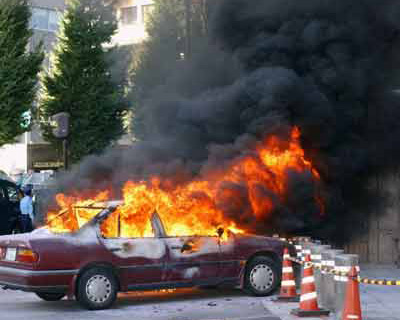20 December 2010 - Vehicle fires are one of the scariest things that can happen on the road ?and they happen more often than you think. The National Fire Protection Association (NFPA) says 33 car fires are reported every hour in the U.S., and 18 percent of all reported fires occur on a road or highway and involve a motor vehicle. One person per day died in a car fire incident between 2003 and 2005, and in 2007 there were 258,000 vehicle fires causing 385 deaths, 1,675 injuries and 1.41 billion dollars' worth of damages. Teens and young adults with driver's licenses are most likely to be involved in car fire accidents, according to the National Fire Incident Reporting System, and young males are victims more often than females.
These statistics, while sobering, don't mean you should worry that your vehicle is going to spontaneously combust on your drive home from work. But safe driving and regular maintenance are important to reducing your chances of being involved in one of these incidents.
The Fireball Van
My own experience with car fires happened in high school, when a friend bought a used van. He gassed it up weekly but otherwise didn't open the hood. Even when the vehicle started having problems starting, he ignored any maintenance. At least until other passengers and I noticed a burning smell.
My buddy attributed it to the odometer: The van had over 100,000 miles on it and a bit of foul odor here and there was natural, he reassured us. But when the engine began belching dense smoke, he finally pulled over. We disembarked as the cockpit filled with smoke and in about 15 minutes, the entire van was a fireball. To make matters worse, the fire wasn't covered by insurance.
That's because standard auto insurance usually doesn't cover vehicle fires, says AAA spokesman Robert Sinclair. "The only way a vehicle will be covered if it catches fire is if you have comprehensive coverage," Sinclair told AOL Autos. "If you've got an older vehicle, we tell people that after probably eight or nine years, it makes sense to drop comprehensive coverage because you'll probably be paying out more than what the vehicle is worth."
Insured or not, watching your vehicle burn by the side of the road is an experience you don't want to go through. Here are a few common-sense tips that can help prevent vehicle fires, provided by the National Safety Council:
1. If you smell burning plastic or rubber, pull over safely and investigate. Don't try to make it home before you determine what the trouble is.
2. Get in the habit of having your car tuned up and checked out at least once a year. An inspection should include examining the vehicle for gas or oil leaks. If you suspect a leak, park a newspaper under your vehicle at night and weigh it down with a heavy object; in the morning, check the paper for stains.
3. If a fuse keeps blowing, that's a sign of electrical trouble, the same as in your house. Don't let it keep happening without investigating, as an overloaded wire can be the source of a fire.
Dousing The Flames
Racecar driver Tommy Kendall told AOL Autos that the best defense against a car fire is to be prepared. "If you never thought about your car catching fire, now is a good time," he said.
Most fires, Kendall said, are a result of a malfunctioning fuel line or a fuel pipe splitting. "If you smell something burning, shutting off the engine will stop the flow of fuel and may prevent a full-blown fire. It's natural to panic in an emergency, but make sure you get off the road first so you're not a hazard to other drivers, or yourself."
"In a race car, there's an onboard fire suppression unit, little pipes that run around the cockpit filled with Halon (a liquefied, compressed non-toxic gas that stops the spread of fire by chemically disrupting combustion). The rules require it. It sprays this foam -- some of it's a fire extinguisher, some of it sucks the oxygen -- mostly to keep the driver safe first, the car second," Kendall said. "But in my own passenger car, I keep a fire extinguisher in the trunk, and you should, too."
Experts counsel not to attempt to extinguish a raging car fire yourself, but there are circumstances when you can try if you have a fire extinguisher. If there is smoke coming from under your hood but no flames, you can crack the hood slightly and spray at the gap from a few feet away. Do not open the hood all the way as the increased oxygen could quickly turn a tiny fire into a big blaze.
However, if the fire is in the rear of the vehicle near the gas tank, you should get away quickly. Only a professional should attempt to douse fires of this sort.
What To Do
If your car catches fire while you are driving, the most important thing to do is to remain calm. Then follow these steps, which also apply if your car ignites in a parking lot.
1. Signal and move immediately to the right shoulder, or right lane.
2. Get the vehicles stopped and shut off the engine while getting yourself and all passengers out of the vehicle.
3. Get as far away from the vehicle as you can, at least 150 feet, but make sure the area you move to is safe and secure.
4. Dial 911, so the dispatcher can notify the fire department.
5. Warn onlookers and others to keep away, as well. If you have some signaling device, you can also attempt to warn oncoming traffic.


